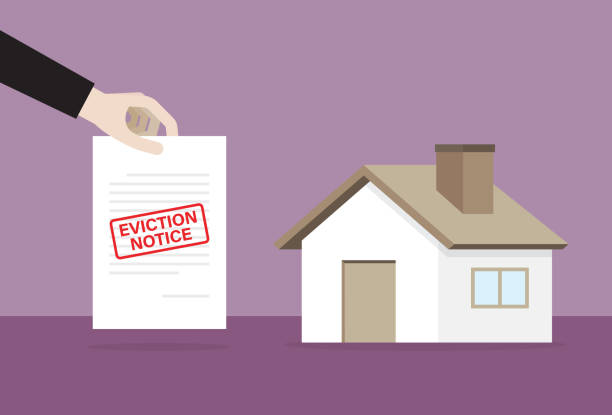If you’ve recently been evicted or have had an eviction in the past, chances are you’re wondering how much of a blemish this will leave on your rental record. You may be asking yourself if there’s any way to minimize the consequences and whether it stays on your record for too long. In this blog post, we’ll answer one of the most common questions we hear from renters: How long do evictions stay on your record? We’ll discuss what a “record” is comprised of and why landlords care about them-as well as provide some solutions for those facing an imminent eviction or looking to move on from an old one. With all that said, let’s dive in and get started answering our initial question-how long does an eviction stay on your record?
Contents
What is an eviction?
An eviction is a legal action taken by a landlord to remove a tenant from their rental property for non-payment of rent or other violations listed in the lease agreement. The eviction process begins when the landlord files an “Unlawful Detainer” lawsuit with the court and serves papers on the tenant stating their intent to evict. If the tenant does not respond or fails to appear in court, a judge can issue an eviction order and the tenant must be removed from the property.

The impact of eviction on your credit report
An eviction typically does not appear on a credit report and will not affect your credit score. However, depending on the state you live in and the actions of the landlord or tenant, it’s possible for an eviction judgment to become part of your public record. If this happens, landlords can access this information in a background check and may decline your application based on the eviction judgment.
How long do evictions stay on your record?
So, how long do evictions stay on your record? An eviction can stay on your rental record for up to seven years. If an eviction becomes part of the public record, it will remain accessible by landlords and other tenants until it is removed or reaches the end of its statute of limitations- typically 7 years. However, some states may have shorter time periods for evictions to remain on a record, so be sure to check your local laws.
How do I find out if I have an eviction on my record?
The best way to find out whether an eviction is on your record is to check the court records in the county where you previously lived. If the eviction was part of a public record, it will show up in these records. You can also check with previous landlords and property management companies for more information about any evictions they reported on your rental history.
What can I do if I have an eviction on my record?
If you have an eviction on your record, there are a few steps you can take to help improve your chances of getting approved for a rental application. For starters, it’s important to be up-front about the situation and explain what happened in detail. Be prepared to provide any necessary documentation that might help support your case. Additionally, offering to pay a higher security deposit or rent in advance can help demonstrate that you’re a reliable tenant. Finally, it may be beneficial to provide references from past landlords who can vouch for your character and rental history.
How to rent with an eviction on your record?
Renting with an eviction on your record can be difficult, but there are ways to make it happen. Start by seeking out landlords who specialize in working with tenants with evictions on their rental records. These landlords may be more understanding and willing to work with you. Additionally, consider joining a tenant organization or association that provides resources and support for renters facing eviction or other challenges. Finally, having a good credit score and work history can give landlords more confidence in you as a tenant, so make sure to stay on top of your credit report and keep it in good standing.

How to remove an eviction from your record?
Unfortunately, once an eviction is part of your public record there’s no way to fully remove it from your rental history. However, if the eviction was over seven years ago and not part of a public record, you may be able to have it “sealed” or expunged from your record. To do this, you’ll need to contact the court where the eviction was filed and follow their procedures for expungement.
Some common mistakes made during eviction proceedings
During eviction proceedings, it’s important to remember that the outcome can have a long-lasting impact on your rental history. With that in mind, here are some common mistakes to avoid during this process:
– Not responding to the eviction notice or court summons. This can lead to a default judgment against you and result in a permanent blemish on your record.
– Not paying rent as ordered by the court judgement. This will make it difficult for you to possibly have the eviction erased from your past records
– Not requesting an adjournment of the hearing if needed. If you need more time to prepare your case or find a new place to live, be sure to ask for an adjournment.
How to avoid eviction?
The best way to avoid eviction is to be a responsible tenant. Always make sure you are paying your rent on time and following the terms of your lease agreement. Additionally, keep an open line of communication with your landlord-they may be able to work with you if you’re having trouble making payments. Finally, if you’re facing eviction for unavoidable circumstances, try to negotiate a payment plan or apologize and explain your situation.

Conclusion: How long do evictions stay on your record?
Evictions can stay on your record for up to seven years, depending on the laws in your state. Although there’s no way to fully remove an eviction from your rental history, you may be able to have it “sealed” or expunged if it’s not part of a public record. To avoid eviction, remember to be a responsible tenant and always make sure you are paying rent on time, following the terms of your lease agreement, and keeping an open line of communication with your landlord.
FAQ: Eviction
What information is included in an eviction record?
An eviction record contains essential details such as the applicant’s full name and the property’s address. It’s crucial to verify that the applicant is the sole occupant of that address with that name to avoid any mix-up with the eviction record.
How do landlords check for evictions?
Discovering past evictions is crucial for landlords and there are three ways to do so: through credit reports, eviction reports, and landlord reference checks. It is worth noting that while evictions often don’t appear on credit reports, they may if a landlord has obtained a court judgment against you for unpaid rent or damages to their property.
Can I get an apartment with an eviction on my record?
Obtaining an apartment with an eviction history is possible if you remain truthful about your situation and demonstrate your accountability and ability to pay rent promptly.
What happens when you get an eviction notice in Texas?
If you receive an eviction notice in Texas, it’s important to understand the process that follows. Typically, shortly after the landlord receives a Writ of Possession, you (the tenant) will receive a 24-hour notice for vacating the property. Once this time period passes, an officer will come and permit your landlord to remove your personal possessions and physically remove you from the premises. It’s important to be prepared and fully aware of your rights and options during this difficult time.
How late can you rent before eviction in Florida?
Keep in mind that you have a three day grace period to pay your rent in full. As long as you meet this deadline, your landlord is legally prohibited from evicting you for nonpayment of rent.
How much does it cost to evict a tenant in NYC?
Discover the cost to evict a tenant in NYC. The Sheriff’s Office handles the enforcement of court orders or warrants. For a fee of only $140, evictions can be performed with ease.
How far behind in rent before eviction in NY?
Understanding rent evictions in New York: a guide for tenants. If you’ve fallen behind in rent, it’s important to know your rights. Under New York law, a landlord/owner must send you a certified mail notice once your rent is at least 5 days overdue. This notice is the first step towards eviction, so be sure to take prompt action to avoid legal consequences.
How do I file a complaint about an illegal eviction?
If you’ve been illegally evicted by your landlord, dial 911. Ask local law enforcement to help you regain access to your home. To assist the responding officer, provide identification, lease agreement, public utility bill, or any other document with your name and address if available.
What happens if a tenant doesn’t leave after an eviction?
If a tenant resists responding to eviction notice and refuses to vacate the property within the stipulated period, take prompt action with these steps: file an eviction complaint with the relevant local courts, gather evidence that validates the tenant’s violation, and attend the court hearing to present your case professionally.

Trayce served as a grassroots leader and activist in Texas as President of Dallas and Texas Eagle Forum.
Trayce is Mom Caucus Member, Texas Conservative Mamas, Texas Conservative Grassroots Coalition Leader, and Grassroots America Champion of Freedom Honoree.
She currently serves as the Eagle Forum National Issues Chair on Human Trafficking.
Trayce received a Bachelor’s Degree in Marketing from Texas A&M
Currently, she homeschools her youngest child age 13 and graduated her six oldest children, ages 31 to 19.








